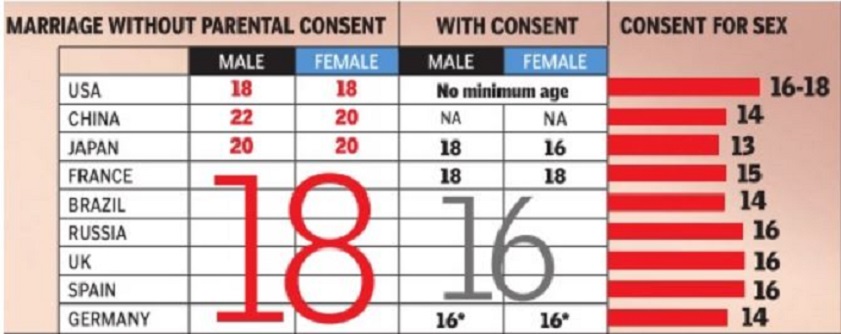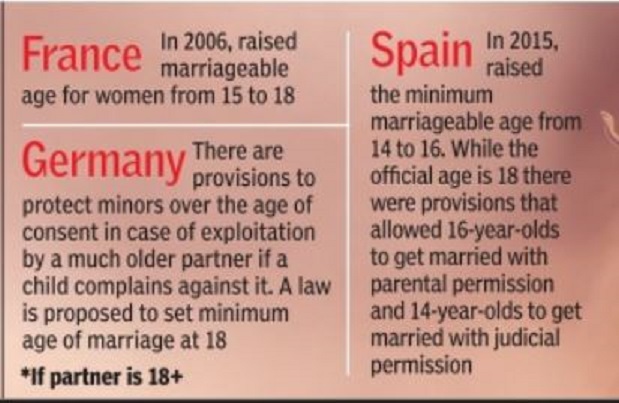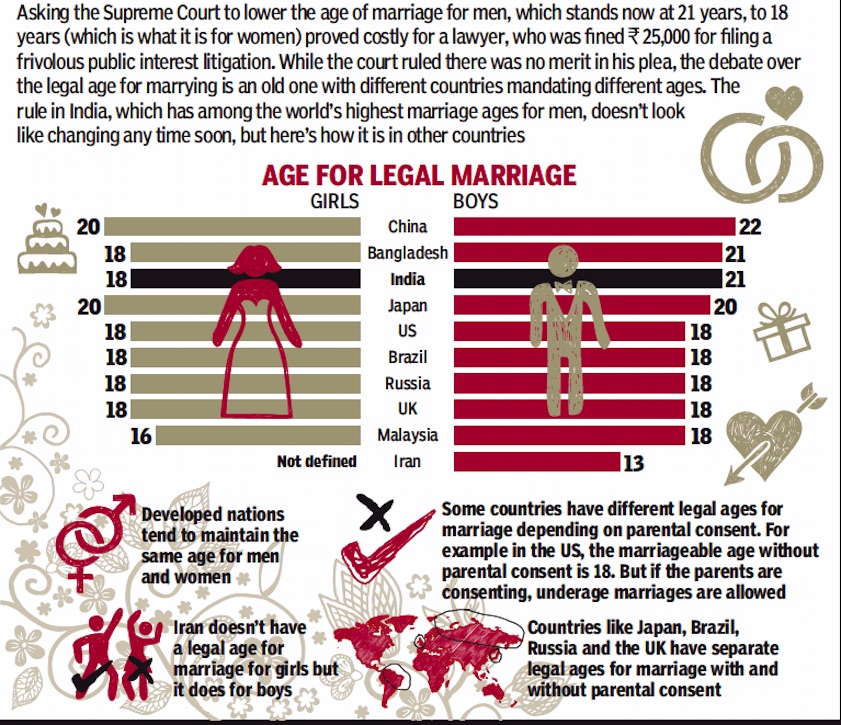Age at marriage: India
This is a collection of articles archived for the excellence of their content. Readers will be able to edit existing articles and post new articles directly |
Contents |
Age of marriage
The practice in other countries

From Oct 12 2017: The Times of India

From Oct 12 2017: The Times of India
The international practice
See graphics:
The minimum age of marriage in the leading economies of the world, 2017
The minimum age of marriage in France, Germany and Spain, 2017
The practice in other countries in 2018

From: October 23, 2018: The Times of India
See graphic:
The minimum age of marriage: The practice in other countries in 2018.
Prohibition of Child Marriage Act
Tough to fix age of marriage for girls: Apex court
Says SC, Upholds High Courts’ Judgments Validating Marriage Of Minors Dhananjay Mahapatra TNN The Times of India 2013/07/25
New Delhi: The Supreme Court on Wednesday said it was difficult to arrive at a straightjacket formula on the marriageable age of girls to fit every case.
Commenting on identical verdicts by Delhi and Andhra Pradesh high courts which had allowed underage girls to marry their lovers, a bench of Justices J S Khehar and Dipak Misra said, “We do not find anything wrong in the two cases decided by the high courts... The parties have remained together. The families have remained united.”
Eight years ago, two high courts allowed minor girls to marry after they acknowledged that they had eloped voluntarily with their beaux, leading the National Commission for Women to rush to the Supreme Court expressing fear that this would legitimize marriage of minors — an offence under the Prohibition of Child Marriage Act.
Wide disparity in laws about marriageable age of girls
The NCW had said that given the wide disparity in various laws on the issue of marriageable age of girls, there was an urgent need to bring uniformity by addressing the question: “what is the correct statutory age for a girl to wed”.
The Supreme Court on Wednesday said it was difficult to arrive at a straightjacket formula on marriageable age of girls to fit every case. “We do not find anything wrong in the two cases decided by the high courts,” a bench of Justices J S Khehar and Dipak Misra said.
Delhi high court/ 2005; Andhra Pradesh high court/ 2006
The Delhi high court on October 5, 2005 and the Andhra Pradesh high court on February 1, 2006 had allowed underage girls to marry their lovers after dropping kidnapping charges registered against the men by police.
While assuring those whose marriages were held valid by the HCs not to worry and carry on with their lives, the SC in 2006 asked all courts not to draw inspiration from these two HC orders.
All cases need not fit the same formula
The bench of Justices Khehar and Misra said on Wednesday, “How can we say all cases must fit to the same formula? As long as there is no extraneous consideration, coercion, malice, misuse or assault, the HCs were perfectly placed to pass these orders. The parties have remained together. The families have remained united.”
In conflict with Prohibition of Child Marriage Act?
NCW counsel Aparna Bhat said there were laws in conflict with “secular laws like Prohibition of Child Marriage Act and permitted underage girls to marry” and requested the court to find an answer.
The bench said, “The two cases dealt by the high courts were not those where the girls were lured away or enticed. Can we pass an order annulling the marriage now? Have the girls who have now become adults given a statement contrary to what they had told the HCs then? As far as uniformity of marriageable age is concerned, the NCW must approach the appropriate authority. Who are we to bring in uniformity.”
The bench added NCW should register its protest when taking up cases where it finds the women were harassed, coerced or misused.
Issue of uniformity kept open
The court disposed of NCW’s appeals filed against the two HC judgments but kept open NCW’s plea for bringing in uniformity in legislations on marriageable age of girls.
It gave eight weeks to NCW and additional solicitor general Indira Jaising to hold consultations with stakeholders and report back to the court.
Court judgements
Make child marriages void: SC, 2017
Amit Anand Choudhary, Make child marriages void: Court, Oct 12, 2017: The Times of India
Terming child marriage a social evil that endangers the life and health of the girl child, the Supreme Court on Friday said such marriages should be declared void and stringent punishment prescribed for those who promote and such practices.
Although the Prohibition of Child Marriage Act (PCMA) bars child marriages, these are held to be valid unless challenged by the minor, virtually giving legal approval to the institution of child marriage till its validity is challenged.
Only Karnataka has amended the Act and declared any marriage of a child, a female aged below 18 years and a male below 21 years, as void. Favouring amendment in the law to declare child marriage illegal, a bench of Justices Madan B Lokur and Deepak Gupta said that other states must follow Karnataka's example.
SC also suggested that penal provisions should be made stringent to punish members of a family who force a child into a matrimonial alliance. It said the punishment under PCMA was not sufficiently punitive and observed that PCMA was being misused as women promoting child marriages were kept out of the penal provision.
Impact of 2017 Consent judgement on Rajasthan
Himanshi Dhawan, Rajasthan's girls stare at a hopeless future, October 12, 2017: The Times of India

From: Himanshi Dhawan, Rajasthan's girls stare at a hopeless future, October 12, 2017: The Times of India
Reema Bairwal's (name changed) face is covered in a heavy green veil.Married last year, when she finished school, the 17-year-old lives in Sohela village in Rajasthan's Tonk district. “I wanted to study . Now my day is spent doing housework. I can't go out or meet anyone without permission,“ she says.
The Supreme Court criminalised sex with a minor wife. For young brides like Reema, the law provides for annulment of marriage and now even the right to file charges of rape against a husband for forced intercourse, but activists say young girls, often poor and illiterate, have no means or awareness to do this.
Neha (name changed), who was married last year as soon as she turned 16, seems resigned. “My parents did not have the money for a separate wedding so they married off my sister and me at the same time,“ she says.
When is she expected to go to her husband's house? “Soon,“ she says, hinting the consummation of marriage could happen anytime. She wasn't forced into the marriage but her vacant eyes reveal the hopelessness with which she views her future.
The 2011 Census by National Commission for Protection of Child Rights and Young Lives, an NGO, shows that 69.5 lakh boys and 51.6 lakh girls have been married before the legal age of 18 and 21 years, respectively. Rajasthan has the highest percentage of child marriages among girls (2.5) and boys (4.69).
Marriage valid if minor doesn’t declare it void as adult: HC, 2021
Ajay Sura, Sep 20, 2021: The Times of India
Marriage valid if minor doesn’t declare it void as adult: HC
The Punjab and Haryana HC has ruled that a girl married off before the age of 18 can seek separation only through a decree of divorce if she did not declare the marriage void on attaining the age of majority, reports Ajay Sura. It issued the order while setting aside a Ludhiana family court’s refusal to grant divorce by mutual consent to a couple who had got married when the wife was a minor. The family court had ruled that couple’s marriage wasn’t valid in the first place as the wife was younger than 18 at the time of nuptials. “Since the respondent wife was 17 years, 6 months and 8 days old at the time of marriage, and for all intents and purposes no petition was filed for declaration of her marriage as void by the wife, the petition for divorce... should have been allowed,” the HC said.
Courts’ power to fix age of marriage
SC, 2023: Parliament and state assemblies should decide
Dhananjay Mahapatra, February 21, 2023: The Times of India
New Delhi : After decades of judicial activism to protect women rights starting with Vishaka case on sexual harassment at workplace, the Supreme Court toned down its judicial activism and refused to take up a petition seeking uniform marriageable age for men and women, which now is pegged at 21 and 18 years respectively.
Abench of Chief Justice DY Chandrachud, and Justices P S Narasimha and J B Pardiwala, while dealing with Ashwini Upadhyay’s petition which was transferred to SC from the Delhi HC, asked, “Can we strike down marriageable age of 18 years as arbitrary? If we strike it down women and girls of any age can get married as the Supreme Court cannot legislate to fix 21 years as their marriageableage. ”
“These are matters we must leave to the wisdom of Parliament, assemblies, and the governments. We are not exclusive custodians of the Constitution. Uniform marriage age for men and women, howsoever desirable, must be left to the legislature and the government. Neither can the Supreme Court issue a direction to Parliament, nor can it legislate,” the CJI-led bench said.
Interestingly, the SC had invoked void in legislation to lay down a detailed 12-point guidelines to deal with sexual harassment of women at workplace in its Vishaka judgment in 1997. The SC had said: “We direct that the above guidelines and norms would be strictly observed in all workplaces for the preservation and enforcement of the right to gender equality of the working women. These directions would be binding and enforceable in law until suita-ble legislation is enacted to occupy the field. ”
Similarly, though Medical Termination of Pregnancy permits termination of a 20week-old fetus, extendable to 24-weeks pregnancy if two experts opined safety of mother, the SC and the HCs have been repeatedly allowing termination of more than 24 week pregnancies. The SC had allowed entry of women in the age group of 10-50 years into Sabarimala temple, but has hedged the issue relating to entry of Muslim women into mosques fornamaz.
When the SC refused to budge from its stand not to entertain Upadhyay’s PIL, the advocate-turned serial PIL litigant gave vent to his frustration —“It would have been better to keep the petition in Delhi HC for adjudication. What is the purpose in transferring it to SC and then dismissing it. ”
However, the SC agreed to consider a petition by Chetna Welfare Society, which sought a new ground for divorce — irretrievable breakdown of marriage. The bench asked the Centre to file a response in four weeks.
Penalties for child marriages
MP, 2018: 2 men denied govt jobs, move SC
Court Issues Notice To MP, Seeks Reply
Two men have knocked the doors of the Supreme Court after their applications for jobs with the Madhya Pradesh government were rejected under Junior Civil Services Recruitment Rules because their parents got them married before they attained the legally permissible marriageable age of 21 years.
After their advocate Neelam Gokhale termed the rule discriminatory and said the two men otherwise met the eligibility criteria, the bench issued notice to the Madhya Pradesh government and sought its response in four weeks.
The two men, one married off at the age of 15 years and 10 months in May 1990 and the other at the age of 18 years and 11 months in June 1996, are working as patwaris in the state and wanted to apply for the post of ‘naib tehsildar’ in pursuance to an advertisement issued by the state government.
“However, their applications were rejected by the online portal on account that the age of the petitioners at the time of marriage was below the legally prescribed age and, hence, they were barred from public employment,”Gokhale said.
In the appeal, the petitioners said the SC had entertained a petition in 2012 by one Ratnarashi Pandey, who had challenged the validity of Rule 5 of MP Civil Services (General Conditions of Service) Rules which said that no candidate would be eligible for appointment in any service or post if s/he had married before the permissible age.
During pendency of Pandey’s petition, the state government had deleted the clause prohibiting employment of those who had married before attaining the legally permissible age. However, it was kept alive in the 2011 Rules for recruitment of junior civil servants.